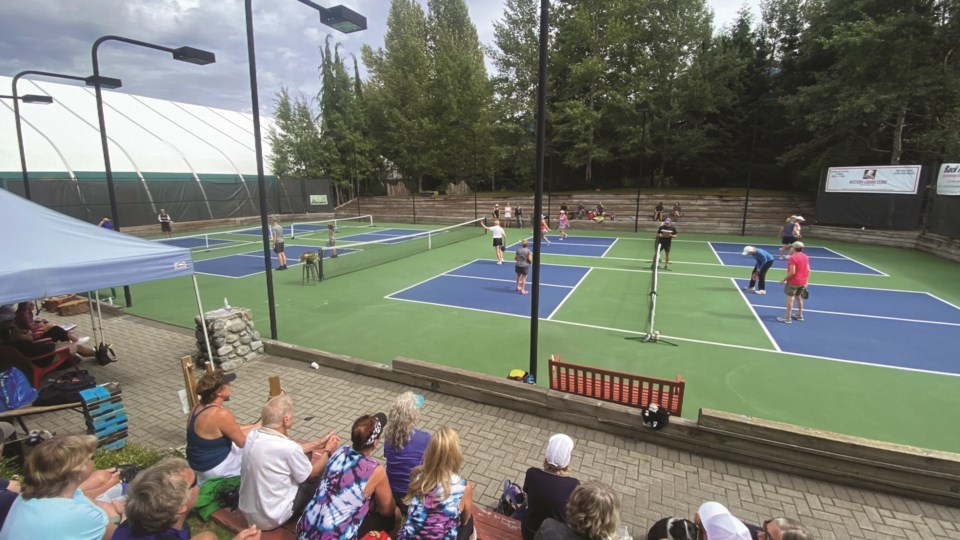In recent years, the Whistler Racket Club (WRC) has grown into a place where residents and visitors—young and old—come together to share a passion for tennis and pickleball, connect with co-workers at staff parties, form life-long friendships at summer camps, and attend Mature Action Community events.
But this community hub could soon be gone. The land at 4500 Northlands Boulevard, purchased by Beedie Living in 2017, is in the midst of rezoning. While the Resort Municipality of Whistler (RMOW) and the developer are negotiating community amenity contributions (CACs), WRC users are rallying to ensure the facility’s future remains part of the plan.
Back in 1988, the site was originally promised to be a world-class, weatherproof tennis centre as part of the development rights of Park Georgia, the company behind the Montebello townhomes. The project was meant to include a stadium court, four indoor courts, 12 outdoor courts and the capacity to host televised events. Instead, Park Georgia built three indoor courts, seven outdoor courts and a dining facility—meant only as a temporary measure—in 1993. The property later changed hands to the Holborn Group in 2002, before being sold to Beedie Living in 2017.
Calls for continuity of play
The WRC is hosting an information session on Aug. 30 ahead of the formal community consultation to mobilize its diverse user base.
“It’s open to everyone interested in the future of the facility, and there are a lot of different user groups. It’s not just racket sport players,” said John Konig, president of the Whistler Tennis Association.
Community groups such as the Mature Action Community, non-profits, and parents of children in summer camps are all encouraged to attend.
“This is an information meeting, and we want to make sure everyone has an understanding of the process and the situation,” said Ben Thomas, representing the pickleball community. “We want to share our concerns with the current proposal, and really listen to everybody and hear what they have to say—while at the same time celebrating the whole community.”
The session will feature a “situation summary,” a Q&A, and a mock-up of what a future facility could look like. Music, social activities such as tennis mixers and kids’ events will also run during the afternoon. The event runs from 2 to 8 p.m. Free parking is available onsite.
Thomas stressed the WRC’s main message: Whistler lacks indoor, year-round recreational amenities, and continuity of play should be prioritized.
“What the racket facility offers is a weather-independent indoor solution for a variety of different activities,” he said. “If this amenity is removed, it should be replaced before, not after, to maintain continuity of play.”
Public engagement ahead
Beedie Living will host formal public consultation events on Sept. 15 and 17, while the RMOW will hold its “Add Your Voice” session Oct. 2.
Mayor Jack Crompton emphasized no decision has been made on the site.
“All decisions will be made with the benefit of a robust public process,” Crompton told Pique. “It’s one of the most important decisions we will make, and we aren’t taking it lightly. Hopefully that motivates people to participate.”
At the heart of the debate is the size and structure of the community amenity contributions tied to the rezoning. What the CAC looks like will be informed through formal public consultation this fall.
RMOW staff, following a land-lift analysis, determined Beedie should contribute $57.8 million—equal to 75 per cent of the $77.1-million increase in land value expected from rezoning.
Beedie has instead proposed a package valued between $38.6 and $47.1 million, depending on how assets are assessed. The developer’s offer includes employee housing, childcare, a community space, cultural initiatives, public art, health-care funding, and $10 million earmarked for an off-site recreation facility.
Rob Fiorvento, Beedie’s managing partner, said the company has already invested heavily in keeping the WRC open.
“We’ve been subsidizing the racket facility since we bought it—to the tune of a million and a half dollars—just to keep it afloat,” Fiorvento said. “But strictly running a racket facility out of that building is not a profitable business.”
He added Beedie’s CAC proposal, worth more than what they originally paid for the land, is “unheard of” for the developer.
Still, racket club users argue the recreation replacement is undervalued and spread out across phases that could take 10 to 20 years.
“We’ve seen it before—what was promised as temporary becomes permanent,” Thomas said. “The amount allocated for recreation is phased over decades, and that just isn’t going to work.”
Sports on the rise
The push to preserve racket sports in Whistler comes as both tennis and pickleball enjoy surging popularity worldwide.
According to the 2024 International Tennis Federation report, there are now 106 million tennis players globally—a 25.6-per-cent increase since 2019. In Canada, participation jumped from 3.9 million players in 2021 to nearly 5 million in 2024.
Pickleball’s growth has been even more dramatic. The Sports & Fitness Industry Association reports participation in the U.S. reached 19.8 million in 2024, a 311-per-cent increase over three years. In Canada, roughly 1.54 million people now play pickleball—up 57 per cent since 2022, with the fastest growth among adults aged 35 to 54.
What’s next?
Beedie maintains its rezoning plan must balance economics with community needs.
“At the end of the day, the project has to stand on its own,” Fiorvento said. “We’re not saying we’ve got it perfect. That’s part of the conversation we want to have—around phasing and delivery of those community amenity contributions.”
For Thomas, the priority remains clear.
“The CAC should replace the rec facility before any existing amenities are removed. Continuity of play is essential,” he said.
Whether the Racket Club remains part of Whistler’s recreational fabric will depend on the outcome of this fall’s rezoning process.
Or, Crompton puts it: “The unsatisfying truth is the answer to most people’s questions will be decided by the upcoming process. Hopefully that motivates people to participate.”




